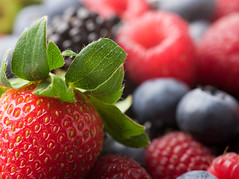
Antioxidants are nutrients found in foods or dietary supplements, which can prevent or delay oxidative damage in our body and cells. Our cells naturally produce by-products called free radicals when using oxygen. Despite it being the body’s natural process, these free radicals can cause damage in the future. Antioxidants work as “free radical scavengers”, finding the free radicals and repairing any damage caused by them.
When oxidative damage occurs in the body for an extended period of time, individuals can develop diseases such as macular degeneration, diabetes, heart disease and cancers. Therefore, a diet which includes antioxidant rich foods is highly recommended.
Commonly known antioxidants:
Vitamin A:
It is recommended for women to consume 800mcg daily and for men to consume 1000 mcg daily.
Sources of vitamin A include egg yolk, cheddar cheese, milk, sweet potatoes, pumpkin, cantaloupe, broccoli, apricots, spinach, carrots, tomatoes, and peaches.
Vitamin C:
It is recommended for both men and women to consume approximately 60mg daily.
Sources of vitamin C include citrus juices and fruits, tomatoes, berries, potatoes (with skin), green and red peppers, broccoli, and spinach.
Vitamin E:
It is recommended for women to consume 8mg daily and for men to consume 10mg daily.
Sources of vitamin E include wheat germ, vegetable oil, avocado, whole grain products, egg yolk, nuts and seeds, peanut butter, and green leafy vegetables.
Other antioxidants include lutein, lycopene and selenium.
Lutein is found in foods with a yellow or orange pigment such as corn, cantaloupe, butternut squash and mangoes.
Lycopene is found is foods with a red pigment such as tomatoes and watermelon.
You can find selenium in foods such as fish and shellfish, red meat, chicken, eggs and grains.
Antioxidants can be used to help treat or prevent medical conditions such as cancers, coronary artery disease, macular degeneration, Alzheimer’s and even some arthritis related conditions. Studies suggest it is best to get your antioxidants from a diet rich in fruits and vegetables rather than supplements. No single antioxidant alone can protect the body, therefore it is imperative to consume a diet rich in fruits and vegetables. The brighter the color the better!
Laurie Taunton MS R.D.
ltaunton@hotmail.com
516-650-5451
—
Laurie Taunton is a Registered Dietitian with her Master’s of Science in Sports Nutrition. She has been working as a clinical dietitian at Winthrop University Hospital for the last 6 years. In addition, she is a guest lecturer for undergraduate classes at C.W. Post. Laurie practices what she preaches by living an active and healthy lifestyle. Laurie enjoys many activities such as soccer, running, weight lifting, spinning and most recently Bikram Yoga. Laurie started Bikram Yoga in February of 2011 and hasn’t looked back. She has completed half marathons, tough mudders and summer series running events which have all taken a toll on her legs and knees. Since taking Bikram yoga, not only has Laurie experienced mental clarity, weight loss, and flexibility but it has strengthened her legs and knees. In essence, this has helped her achieve a deeper stretch to help her muscles recover and complete long runs with less aches and pains. Every month she researches and writes nutrition articles with up to date information for our yoga students. These articles provide each one of us with healthy information to improve our yoga practice. It’s important to realize it’s not only what we do inside the yoga room, but also the nutrition we put in our bodies as well that can help improve our postures, breathing, and achieve optimal results of all our hard work.

